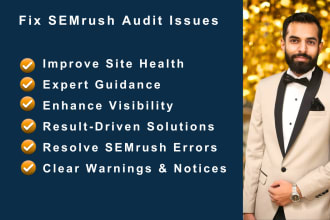Browse categories
Technical SEO
A strong, technical SEO foundation ensures your site’s properties perform flawlessly
|6,000+ Results
Sort by:

Level 2
I will fix semrush ahref moz search console site audit errors for higher ranking
From $10
Offers video consultations

Level 2
I will fix google search console, semrush, ahrefs or moz technical SEO errors or issues
From $40
Offers video consultations
Level 2
I will fix page indexing issue, google search console errors
From $20
Offers video consultations
Technical SEO FAQs
What is Technical SEO and how does it differ from other types of SEO?
Technical SEO refers to the process of improving your website’s technical aspects to boost its ranking on search results. This includes optimizing website speed and structure, as well as optimizing it for mobile and minimizing or eliminating crawl errors, such as broken links and missing pages. Search engine optimization (SEO) encompasses different aspects, some of which tend to overlap. For instance, technical SEO shares some similarities with on-page SEO. However, the former focuses more on your website to improve user experience, while the latter focuses on optimizing your content. Off-page SEO, meanwhile, focuses on using SEO tactics outside of your website, such as link building and guest posting, to improve your website ranking and make it more authoritative.
Why is Technical SEO important for my website and online presence?
Technical SEO can help your website rank higher on search engine results pages (SERPs). When you optimize your website technically, you’re also making it easier for search engine robots to crawl your website, assess its different technical aspects, such as page load speed, and understand your website. Furthermore, by performing technical SEO, you can remove duplicate content and build structured data, as well as find and address any issues on your site’s structure. Aside from making it easier for search engines to crawl your site, you’re also making your website more user-friendly and functional.
Can you explain some of the common technical issues that impact a website's SEO performance?
Technical issues can affect not only your website’s ranking but also its usability and effectiveness. Some of the common technical issues that are often overlooked include: - HTTPS issues – Google considers a website’s HTTPS encryption, which indicates that a website is safe to visit, as a weak ranking signal. If your website doesn’t have an SSL or TLS certificate, then your ranking on SERPs may be adversely affected. - Broken pages – Broken pages, such as 4XY errors and 5XY errors, won’t be indexed by search engines like Google and, thus, won’t direct traffic to your website. - Duplicate content – Duplicate content, whether it’s exact or something closely similar, can affect your website’s SEO as it can confuse search engines and prevent them from giving the right content to your audience. - Crawlability – Crawling issues can affect your site’s visibility on SERPs. For instance, if your site has no XML sitemap, it may be difficult for search engines to crawl and understand your website. - Loading page speed – Slow page load speeds can affect user experience and engagement. If your website loads slowly, chances are your visitors will bounce and visit your competitor’s site instead.
Can you provide examples of technical SEO optimizations that can be made to a website?
Some of the technical SEO optimizations that you can do to your website include optimizing its page load speed, creating an XML sitemap, ensuring that it’s mobile-friendly, incorporating structured data, and fixing duplicate content issues. Fiverr’s technical SEO freelancers can provide a range of technical SEO services, such as consultations, site SEO audits, XML sitemaps, index optimization, and HTTPS setup. Some of the other technical SEO services that Fiverr freelancers offer include fixing crawlability issues, Schema markup optimization, and mobile usability issues.
How do you measure the success of a Technical SEO project?
Several factors indicate the success of a technical SEO project, aside from getting better organic search results and improved visibility on SERPs. These include having a higher domain authority and click-through rate, lower bounce rate, more time spent on a page, and increased conversion rates. Furthermore, some technical metrics you or your site administrators need to measure include page load speed, indexed pages, mobile responsiveness, and crawl errors.
How can I stay up-to-date with the latest technical SEO best practices and changes to search engine algorithms?
Search engine algorithms change frequently, and if you don’t keep up with the latest algorithm updates, then you may risk losing organic traffic and conversions, as well as losing some of your visibility. While you can’t control these changes, you can take steps to maintain your website quality, functionality, and usability, such as focusing on maintaining mobile-friendliness, keeping your content or website information updated, and monitoring and fixing technical issues. You can also follow Google SearchLiaison (@searchliaison) on Twitter, check the Google Search Central Blog, or visit Google Trends to check the latest or emerging trends.




















